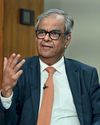
MANUFACTURING IS THE backbone of economic development, and India aims to become a global manufacturing hub by 2047. While technology will be a part of this journey, it has to be the right fit. “Technology must work for business,” says Jayanta Banerjee, Tata Steel’s Group Chief Information Officer (CIO), emphatically. That’s not easy to accomplish amid a tech disruption when there are constant discussions on smart manufacturing and the high investments involved.
That said, shop floors across manufacturing firms have undergone a remarkable transformation thanks to the disruption. At Tata Steel, for instance, the entire agglomeration operation—a type of conditioning of iron ore before it makes its way to the blast furnace—is now done by people sitting in an air-conditioned room in Jamshedpur through an array of LED screens. “Our mines are 350 km away, but it hardly matters,” says Banerjee, adding that in the future, more work will take place remotely, with fewer people on the shop floor.
While terms such as AI, Gen AI and ML are a part of the lexicon now, the challenge is to make them relevant to the manufacturing process, say experts. “Technology will not replace human excellence… but competence levels vary across the workforce,” says Banerjee, adding that AI’s role is to remove that variability.
However, the western template of Industry 4.0 (replacing humans with automation) will not work in India since livelihoods stand to be affected, say experts. Instead, one must bring in effectiveness with empathy; instead of knocking off a part of the workforce, one can upskill them, say experts.
FROM THE PRESENT TO THE FUTURE
This story is from the {{IssueName}} edition of {{MagazineName}}.
Start your 7-day Magzter GOLD free trial to access thousands of curated premium stories, and 9,000+ magazines and newspapers.
Already a subscriber ? Sign In
This story is from the {{IssueName}} edition of {{MagazineName}}.
Start your 7-day Magzter GOLD free trial to access thousands of curated premium stories, and 9,000+ magazines and newspapers.
Already a subscriber? Sign In

"Inaction is worse than mistakes"
What was the problem you were grappling with?

TEEING OFF WITH TITANS
BUSINESS TODAY GOLF RESUMES ITS STORIED JOURNEY WITH THE 2024-25 SEASON OPENER IN DELHI-NCR. THERE ARE SIX MORE CITIES TO COME

AI FOOT FORWARD
THE WHO'S WHO OF THE AI WORLD GATHERED AT THE TAJ MAHAL PALACE IN MUMBAI TO DELIBERATE THE TRANSFORMATIVE IMPACT OF AI ON INNOVATION, INDUSTRIES, AND EVERYDAY LIFE.

Decolonising the Walls
ART START-UP MAAZI MERCHANT IS ON A MISSION TO BRING INDIA'S FORGOTTEN ART BACK HOME

"I'm bringing Kotak under one narrative, one strategy, one umbrella”
Ashok Vaswani is a global banker who spent most of his career overseas at institutions like Citi Group and Barclays, among others.

CHOOSING THE CHAMPIONS
The insights and methodology behind the BT-KPMG India's Best Banks and NBFCs Survey 2023-24.

'INDIA IS AT AN EXTREMELY SWEET SPOT'
The jury members of the BT-KPMG Survey of India's Best Banks and NBFCs discuss developments in the banking sector and more

FROM CRISIS TO TRIUMPH
Dinesh Kumar Khara stewarded SBI through multiple challenges during his tenure, while ensuring that profits tripled, productivity soared, and the bank consolidated its global standing

AT A CROSSROADS
BANKS ARE FACING CHALLENGES ON BOTH SIDES OF THE BALANCE SHEET-ASSETS AS WELL AS LIABILITIES-WHICH ARE PUTTING PRESSURE ON MARGINS.

EXPANSIVE VISION
Bajaj Finance, an outlier in terms of digitisation, faces stiff competition. But it continues to expand its reach